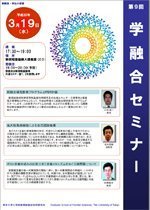AY2007 9th Gakuyugo Seminar
- Date&Time:
- Mar 19, 2008 17:30~19:00
- Venue:
- Large Lecture Room (2C0), New Frontier Science Bldg.

Nuclear Fusion Research Education Program and ITER Project
Professor Yuichi Ogawa
The Department of Advanced Energy Engineering and the Department of Complex Science and Engineering of the Graduate School of Frontier Sciences will start a fusion research education program in 2008. The content of this educational program and its background, such as the International Thermonuclear Experimental Reactor (ITER) project and the recent development of fusion energy, will be introduced.

Self-recognition mechanism by congenital immune cells
Associate Professor Naoki Matsumoto
The body of vertebrates, including humans, is exposed to the danger of invasion by pathogens from the outside world and the development of cancer in the body. The immune system defends our bodies by recognizing, attacking, and eliminating pathogens and cancer cells. The immune system is a double-edged sword, and when it mistakenly attacks the self, it causes autoimmune diseases. In this seminar, we will focus on natural killer (NK) cells, which are responsible for innate immunity among the cell groups that constitute the immune system, and introduce the mechanism by which NK cells identify the normal self and prevent attacks on the self.

Comparative Analysis of the Post-Kyoto Framework and Issues Related to the Kyoto Mechanisms
Professor Takaharu Matsuhashi
With the start of the first commitment period of the Kyoto Protocol, international negotiations on the so-called post-Kyoto framework, the framework after the first commitment period, have started. In this lecture, we will present a comparative analysis and forecast of post-Kyoto frameworks, focusing on the "sectoral approach" proposed by the Japanese government, as well as an analysis of the problems and future possibilities of the Kyoto mechanisms, which have played an important role in the first commitment period.
*The contents of this page were developed based on a machine translation.

